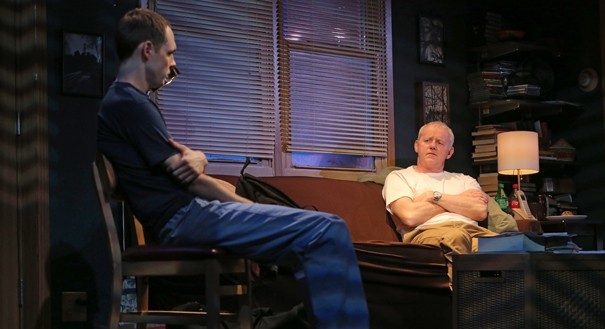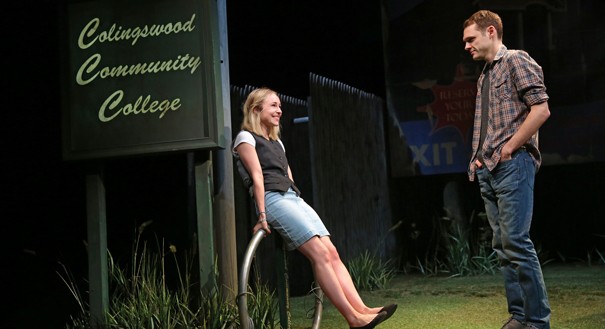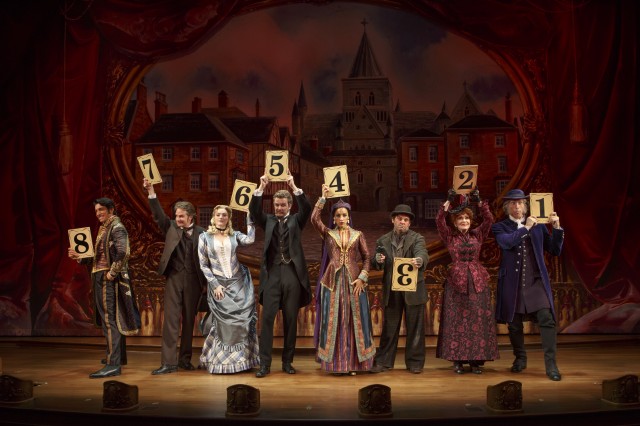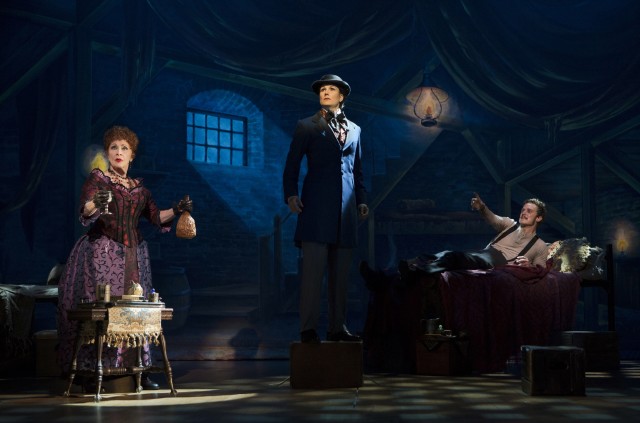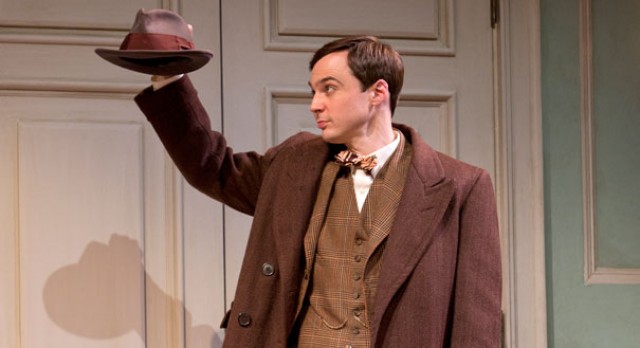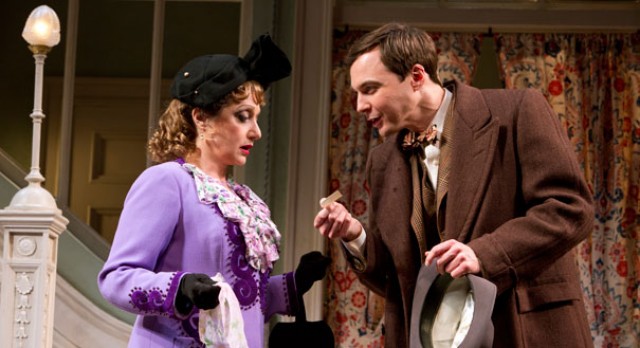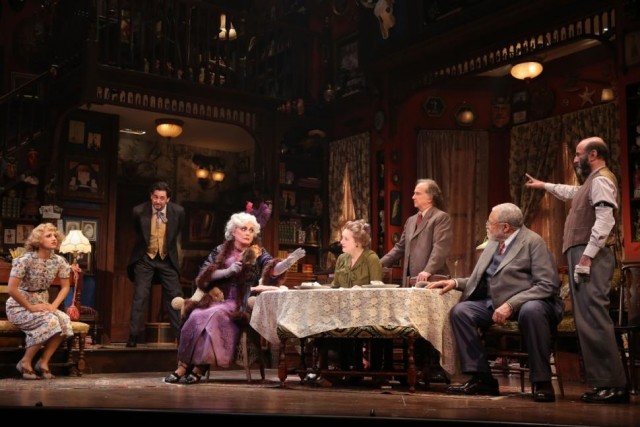
Daily life at the Sycamore house is always an adventure, filled with madness and mayhem (photo by Joan Marcus)
Longacre Theatre
220 West 48th St. between Broadway & Eighth Ave.
Tuesday – Sunday (and some Mondays) through January 4, $37 – $152
www.youcanttakeitwithyoubroadway.com
Earlier this year, Lincoln Center presented the world premiere of Act One, James Lapine’s engaging Broadway adaptation of Moss Hart’s 1959 memoir detailing his beginnings in theater, focusing on his first collaboration with writer-director George S. Kaufman. One of the many fruits of that partnership is now back on the Great White Way, a rousing revival of the Pulitzer Prize-winning You Can’t Take It with You. Set in Depression-era New York City, the three-act madcap farce follows the trials and tribulations of the eccentric Sycamore family, led by patriarch and grandfather Martin Vanderhof (James Earl Jones), who has enjoyed the simple pleasures of life ever since he suddenly walked out on his job more than three decades earlier and now lives contentedly, refusing to pay income tax and raising snakes. His daughter, Penny Sycamore (Kristine Nielsen), a quirky, perpetually pleasant would-be playwright and painter, is married to Paul Sycamore (Mark Linn-Baker), a goofy, unemployed tinkerer who spends most of his time in the basement inventing different kinds of fireworks with the oddball Mr. DePinna (Patrick Kerr) and playing with his Erector set. Penny and Paul’s younger daughter, Essie Carmichael (Annaleigh Ashford), is a wannabe dancer in endless motion, pirouetting her way through the day in tutus and making candies that her amateur printer husband, Ed Carmichael (Will Brill), goes out and sells when he’s not playing Beethoven on the xylophone for her to dance to. Essie’s ballet teacher, Boris Kolenkhov (Reg Rogers), is a blustery Russian émigré obsessed with Stalin and the revolution. Despite having little money — the Sycamores regularly eat corn flakes for dinner — the family has a well-treated maid, Rheba (Crystal Dickinson), who really runs things around the house; Rheba is dating Donald (Marc Damon Johnson), who hangs around doing odd jobs. Finally, there’s older daughter Alice Sycamore (Rose Byrne), a prim and proper young lady who is desperate to have a normal life despite her crazy, mixed-up family. (Think Marilyn in The Munsters, for example.) Alice is in love with Tony Kirby (Fran Kranz), her very wealthy boss at the Wall Street firm started by his mogul father (Byron Jennings), who raises extremely expensive orchids in his spare time. When the two families are brought together to celebrate Alice and Tony’s engagement, mayhem erupts, jeopardizing the lovebirds’ future.
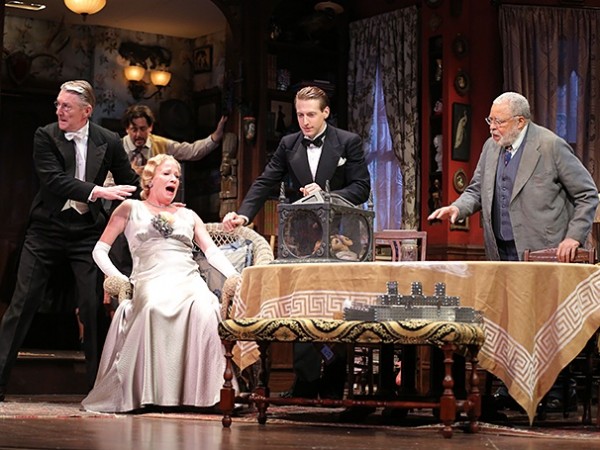
Things don’t go quite as planned when the Kirbys and the Sycamores get together (photo by Joan Marcus)
You Can’t Take It with You, which was first produced on Broadway in 1936 and turned into an Oscar-winning film in 1938 by Frank Capra (with Jean Arthur, Lionel Barrymore, James Stewart, Eddie Anderson, Ann Miller, and others), is a lovable romp about 1930s New York City, a fun and fanciful riff on the very serious growing gap between the rich and the poor, the haves and the have-nots. David Rockwell’s living-room set is breathtaking, every nook and cranny occupied by paintings, photographs, masks, sculptures, trinkets, tchotchkes, toys, and other, often loony, paraphernalia. Director Scott Ellis (The Mystery of Edwin Drood, Harvey) keeps it all moving at a wickedly funny pace, a nonstop barrage of wacky high jinks, rapid-fire non sequiturs and double entendres, and over-the-top physical comedy, while never letting the audience forget that these are very hard times indeed for families such as the Sycamores, who live in the shadow of such tycoons as Mr. Kirby and his stuffy, genteel wife (Johanna Day.) The cast is superb, led by the humble Jones (who actually makes mention of the “dark side,” eliciting titters from Star Wars fans in the audience), the always welcome Nielsen (Vanya and Sonia and Masha and Spike, The Killer), the ever-dapper and pristine Jennings (Ten Chimneys, Arcadia), and theater doyenne Elizabeth Ashley as the hash-slinging Grand Duchess Olga Katrina. Some of the physical comedy does grow stale, particularly Brill’s (Tribes, Not Fade Away) twisting mannerisms, Ashford’s (Kinky Boots, Masters of Sex) never-ending spins and twirls, and an unnecessary appearance by Julie Halston (The Tribute Artist) as a drunk actress, but those excesses can be forgiven amid all the boisterous merriment to be had in a play that combines an obviously old-fashioned sensibility with some social, political, and economic observations that are still relevant today, more than seventy-five years after its debut.
